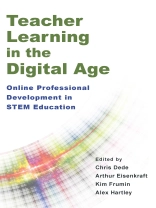With an emphasis on science, technology, engineering, and mathematics (STEM) training,
Teacher Learning in the Digital Age examines exemplary models of online and blended teacher professional development, including information on the structure and design of each model, intended audience, and existing research and evaluation data. From video-based courses to just-in-time curriculum support platforms and MOOCs for educators, the cutting-edge initiatives described in these chapters illustrate the broad range of innovative programs that have emerged to support preservice and in-service teachers in formal and informal settings.
“As teacher development moves online, ” the editors argue, “it’s important to ask what works and what doesn’t and for whom, ” They address these questions by gathering the feedback of many of the top researchers, developers, and providers working in the field today.
Filled with abundant resources,
Teacher Learning in the Digital Age reveals critical lessons and insights for designers, researchers, and educators in search of the most efficient and effective ways to leverage technology to support formal, as well as informal, teacher learning.
เกี่ยวกับผู้แต่ง
Chris Dede is the Timothy E. Wirth Professor in Learning Technologies and former chair of the Learning and Teaching department at the Harvard Graduate School of Education.
Arthur Eisenkraft is a Distinguished Professor of Science Education and director of the Center of Science and Mathematics in Context (COSMIC) at the University of Massachusetts Boston, and a past president of the National Science Teachers Association.
Kim Frumin is a doctoral student focusing on educational technology and new K–12 school designs at the Harvard Graduate School of Education.
Alex Hartley works in a kindergarten classroom helping design and implement engineering and STEM lessons.












